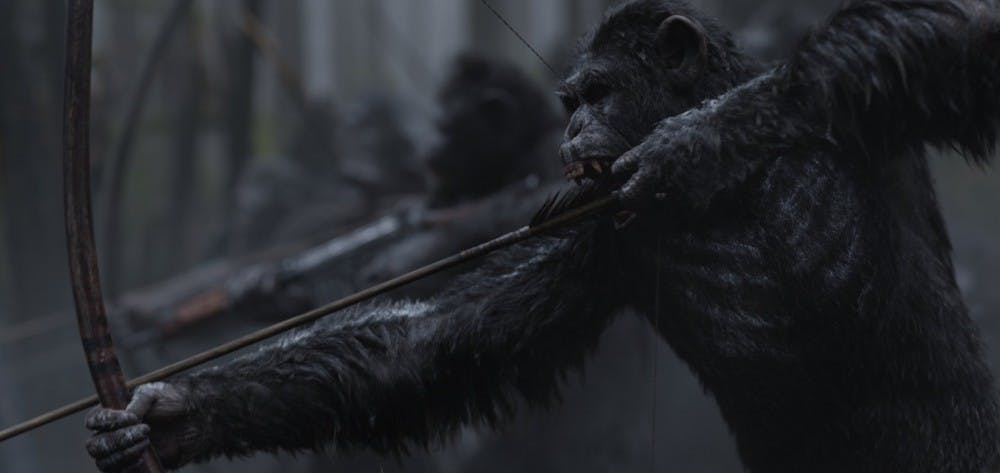By Simon Tessmer
Editor's Note: There Will Be Criticism is a weekly column by Simon Tessmer, a film student at MSU. Tessmer's other reviews can be read on his blog. Check out his last weekly column on "Spider-Man: Homecoming" here.

IMDB | © 2016 - Twentieth Century Fox
By Simon Tessmer
Editor's Note: There Will Be Criticism is a weekly column by Simon Tessmer, a film student at MSU. Tessmer's other reviews can be read on his blog. Check out his last weekly column on "Spider-Man: Homecoming" here.
"War for the Planet of the Apes" showcases the power of narrative cinema. It’s made with such delicate humanity that it rises to the level of film art, despite its ridiculous premise and comical franchise-status. I was shocked, depressed, thrilled and moved to tears by a film that follows a band of intelligent apes at war with humans, the third in a prequel series to "Planet of the Apes (1968)".
At the center of this wonderfully emotional tale is Andy Serkis’ performance as Caesar, leader of the apes, flanked by Maurice (Karin Konoval), Rocket (Terry Notary) and Cornelia (Judy Greer). The apes wage war against the merciless Colonel (Woody Harrelson), and along the way befriend Bad Ape (Steve Zahn) and Nova (Amiah Miller).
"War" succeeds comparably to its science fiction contemporaries "Arrival (2015)" and "Interstellar (2014)" by focusing with clarity on its central emotional relationships, and letting its spectacle lie adjacent. Supporting this strategy are a multitude of incredible performances, on the part of both actors and animators. "War's" central apes are performed so well that I befell a convenient amnesia, and was entranced by their emotional threads rather than their preposterous photorealism. This is David Fincher-esque filmmaking, where the storytelling is so excellent all digital trickery is rendered imperceptible.
Matt Reaves, "War’s" director, not only succeeds in capturing powerful performances, but also elicits stunning score-work from Michael Giacchino that retains the grandeur and texture of War’s source film, but loses the pompous cheese that befalls movie music of the era. Though blaring, flamboyant brass at times clashes with "War’s" stone-cold sobriety; the juxtaposition draws a layer of classical color across an otherwise bleak film.
Reaves further ensnares "War" in classic-film tones by allowing cinematographer Michael Seresin’s visuals to take on the aggressive beauty of Stanley Kubrick. While the occasional direct reference to "Paths of Glory (1957)" shoots across screen, Seresin channels "War’s" obvious parallels to "2001: A Space Odyssey (1968)’s" first act and embodies a Kubrickian symmetrical composition. Seresin punctuates his artful style with dynamic tracking shots that hearken back to Akira Kurosawa’s canonical visual brilliance in "Rashomon (1950)."
The totality of "War" is an anomaly in contemporary genre cinema. It insists on the importance of character and story while juggling the craft of cutting edge technology and the pressures of studio franchise filmmaking. It’s a thrilling, heartbreaking, and inspiring ride that brilliantly locates its essence in the emotions of its protagonists while delivering on explosive visuals and compelling plot points. It’s an excellent film.
Rating: 4.5/5
Support student media! Please consider donating to The State News and help fund the future of journalism.